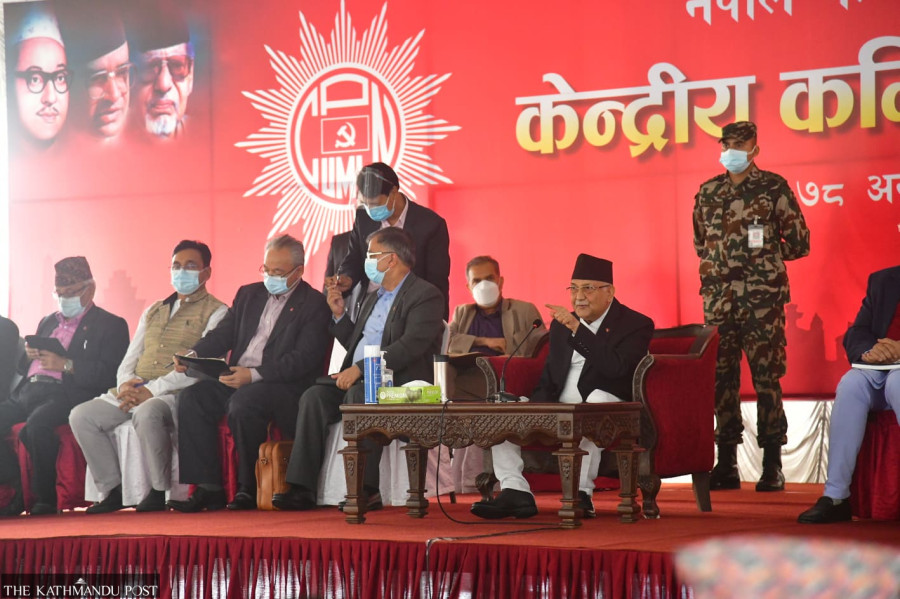Politics
UML claims Deuba doesn’t have popular mandate. Experts disagree
Political and constitutional experts say UML leaders are undermining the people’s mandate and promoting negativity against the judiciary by questioning Deuba’s appointment as prime minister.
Binod Ghimire
Subas Nembang, deputy parliamentary party leader of the CPN-UML, walked up to the lectern at the House of Representatives on Friday to make an address congratulating Sher Bahadur Deuba, who was elected prime minister 10 days ago.
However, Nembang’s congratulatory address was full of satire and taunts against Deuba. He brought up several cases of alleged highhandedness by Deuba from the time he was home minister in the Girija Prasad Koirala-led government in 1991. On top of that, he reiterated Deuba didn’t become prime minister from the people’s mandate but by a court order.
“This is the first time the country has got a prime minister not from the people or the parliament but from a court order,” he said. “There are different Articles and clauses in the constitution that envision the prime minister’s election. However, the present prime minister didn’t get the position based on the constitutional provisions.” Nembang is not the first leader from the main opposition party to claim that Deuba doesn’t have the people’s mandate.
UML chair and former Prime Minister KP Sharma Oli, while addressing party cadres at his residence in Balkot, Bhaktapur on July 14, said Deuba was made prime minister through Paramadesh (a mandamus order), not through janadesh (popular mandate). Oli said the people’s mandate was with him and his party. Four days later addressing the House of Representatives prior to the vote on the confidence motion, UML leader and spokesperson Pradeep Gyawali said earlier Deuba was made prime minister by Shree Panch (King) and this time by Shreeman Panch (five justices).
He was referring to the five-member Constitutional Bench led by Chief Justice Cholendra Shumsher Rana which on July 12 directed President Bidya Devi Bhandari to appoint Deuba as prime minister as he had the backing of a majority of lawmakers of the House of Representatives. While 149 lawmakers belonging to five parties had supported Deuba’s bid for prime minister on May 21, three days later 146 of them had moved the Supreme Court against the dissolution of the House and Bhandari’s move to invalidate his claim.
The Constitutional Bench issued the order stating that over 50 percent of the lawmakers in the 271-member strong lower house had extended their support to Deuba. Political and constitutional experts, who have closely followed the present political process, say the UML leaders are actually undermining the people’s mandate and promoting negativity against the judiciary by arguing that the Deuba government doesn’t have the people’s mandate.
“The court ordered Deuba’s appointment as prime minister because he had the support of a majority of the members of the lower house. That has been proved by the July 18 vote on the confidence motion,” senior advocate Dinesh Tripathi, who specialises in constitutional law, told the Post. As many as 165 members of the 271-member lower house—60 percent— voted for Deuba in the floor test. Tripathi says the UML leaders must stop making a mockery of themselves by talking about people’s mandate when Deuba has already received support from an overwhelming majority in parliament.
Even 22 lawmakers from the UML including eight from the Oli camp voted for Deuba in last week’s vote of confidence. Political experts say it is the parliament where the people’s mandate is tested in a parliamentary democracy. “What kind of people’s mandate are Oli and his camp talking about when just 83 lawmakers are with them,” said Shyam Shrestha, who follows left politics closely. “They should know that the parliament determines the people's mandate in a parliamentary democracy,” Shrestha said Oli and his supporters are making unethical and unconstitutional remarks.
The result of the vote of confidence has shown that the UML is spreading lies in the parliament and streets and this will further erode the people’s faith in the UML if there is any, according to Shrestha. Experts say Oli had overconfidence that he would continue to be in power at least for five years. He is, therefore, finding it hard to accept the reality that his government has been toppled.
Oli hasn’t been present in the House except during the voting on the confidence motion. During the deliberations on the vote of confidence, Deuba had raised concerns over Oli’s absence. He said he was never absent from the House when Oli, as prime minister, addressed it. Deuba said he was expecting Oli, as a leader of the opposition, to make his remarks. The parliamentary party leaders of all the parties had addressed the House on that day.
Oli deputed Gyawali to speak on behalf of the party on July 18 and Nembang on Friday. Hari Roka, a political economist, said it is a mockery of democracy that Oli, who has been in minority since December last year, is talking about the people’s mandate. “He wouldn’t have dissolved the House of Representatives twice if he had a majority,” he told the Post. “He stayed in power for over six months without having a majority.”
Oli dissolved the lower house on December 20 last year for the first time. The Supreme Court on February 23 reinstated it saying the dissolution was unconstitutional. Oli lost the confidence motion on May 10 where only 93 lawmakers stood for him. The UML alone has 121 members in the lower house. The July 18 vote on Deuba’s confidence motion showed Oli’s strength had further eroded with just 83 lawmakers standing with him. “There is no option left with Oli and his supporters other than accepting that Deuba has the people’s mandate,” said Roka.




 13.12°C Kathmandu
13.12°C Kathmandu














